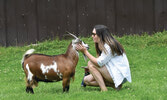By Lisa Boonstoppel-Pot
The first goal was to find a “better place” to raise their family. Once living on the nine-acre property on Wilmot Easthope Rd. in Perth East, Stephen and Casey Howanyk kept looking at the barn, the five-acre hayfield and their goats and wondered…what else could we do?
They were already running sold-out “goat socials” where people could book a 60-minute experience playing in the pasture with the goats, having a picnic by the pond with baked goods and touring the barn.
That field, though. Selling hay was making money but what could generate more cash flow? Goats. Good times. Grapes! The couple already knew about the new wine region taking off in Huron County concentrating on cold-climate grapes. Could it work in Perth too?
“We got our soil tested and it turns out we had really good, loam soil,” explains Casey. They began visiting wineries for research and planted their first grape varieties in 2022. They focused on four varieties – Vidal, Frontenac-Blanc, Marquette and Petit Pearl – which are known for their cold hardiness.
To become a winery, a farm must have at least five acres of grapes so a year later, the other four acres went in. That first acre produced grapes ready to be made into wine this year and the other four will come into production in the fall of 2025.
They are now Perth County’s first winery! At the winery, which is open on weekends only, guests can sample wines and ciders, snack on grazing boxes and, of course, visit the goats. The grazing boxes are made by neighbour Lindsay Higgins of Lynn River Farm (formerly featured in The Rural Voice).
The couple hired Steve Byfield, a known winemaker who also makes the wines at 2nd Street Light in Clinton and Cornerfield near Bayfield. “He is the only black winemaker in Canada,” says Casey. He also operates his own wine cellar, called Nyaria which is derived from the Southern African Shona dialect meaning Humility.
“He is fantastic and humble,” says Casey. “People are surprised our wines are as good as they are and that is all due to Steve…he is creative and artistic with wines.” The couple made wines with purchased grapes until their own grapes were ready.
Rather than focusing on the “terroir” of their wines, Casey likes to talk about the “vibe” on the farm. “Our slogan is Grapes, Goats and Good Times” and we want to create an experience where memories are made and people have a great time on the farm.”
It’s been quite a journey for Casey and Stephen as they both maintain full-time jobs and are raising two young children. He is the facilities manager for an amusement company and she is a teacher. Their children are aged four and two.
“It is busy,” sighs Casey. But, she loves the customer connection and service, the social media output and designing the on-farm store. Her husband is the “master business operator” as described by Casey and does the day-to-day operations, renovations of the barn, rezoning the property and applying for permits.
The business is thriving. Casey anticipates once the start-up loans are paid off in three years, The Perth Farmhouse will be able to support the family. Whether the pair will retire from their jobs is undecided but one of their main goals is to create a home and legacy for their children.
In the meantime, there is work to be done! Renovations are ongoing in the barn. The grapes need training, pruning and weeding. They used to do it by hand but this year hired a crew from Niagara to do the pruning.
Casey also appreciates the support from neighbours and friends. “At first our neighbours thought we were crazy but now they are helpful and supportive. It is a great community.”
She also remembers, fondly, the task of planting the first acre. “We did it with friends and family on a weekend and that is such a great memory.”
Their goals as the grapes mature is to harvest three tonnes of grapes per acre which will require some anti-bird strategies such as netting, squawkers or scarecrows. It’s also a watch on the weather, as an early frost can affect the quality of the crop.
Casey's advice for others thinking of going into a niche farming business is to spend time building up a community of contacts and support from knowledgeable people willing to share their wisdom.
“Farmer Paul (a neighbour) is our hero. He has helped us deliver goats and baled our hay when the baler broke,” says Casey.
It takes years of work, including all the paperwork. The reward, now, is the people. “I can’t believe people come here to drink our wine and play with the goats,” she says shaking her head with wonderment.
Their hard work is paying off and it seems like the grape and goat combination really does create good times. ◊


